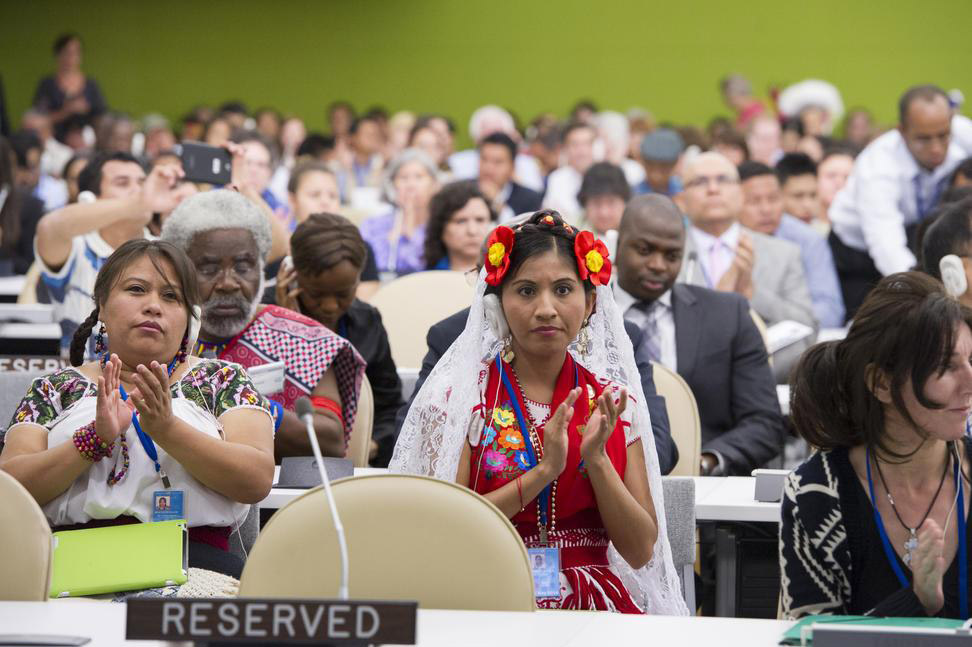February 26, 2026 05:00 am (IST)

UN seeks involvement of indigenous peoples in development agenda
New York, May 13 (IBNS): Indigenous peoples must be a part of the ongoing process to define a global development agenda beyond 2015, United Nations officials said on Monday, calling for explicit assertion of their collective rights as well as the promotion of traditional knowledge to tackle issues such as climate change, as the UN Permanent Forum on Indigenous Issues opened its 2014 session.
The 13th session of the Permanent Forum, which runs through 23 May at UN Headquarters, will focus on the special theme, “good governance” and also consider matters related to the arrangements for the first-ever World Conference on Indigenous Peoples.
The session also comes as the UN continues its efforts to define the global sustainable development roadmap after 2015, the target date for achieving the anti-poverty Millennium Development Goals (MDGs).
“The needs, voices and contributions of indigenous peoples will be a critical part of these efforts,” said UN Secretary-General Ban Ki-moon in his opening remarks, spotlighting climate change as an area of “vital focus.”
Noting that indigenous peoples are often on the frontlines of this existential challenge, he said this fact was borne out yet again on his recent visit to Greenland. On 23 September, Ban will convene a climate summit in New York focused on action and solutions.
“The traditional knowledge and practices of indigenous peoples can help to close the emissions gap and lead us onto a more sustainable path,” he said, urging Member States to recognize the central role of indigenous peoples in meeting the climate challenge.
Also addressing the Permanent Forum, General Assembly President John Ashe underscored that the MDG outcomes for indigenous people have fallen short of expectations. One of the lessons of this, he said, is that policies designed to promote universal access to culturally sensitive social services have been inadequate, and the international community needs to reconsider its approach.
“In the context of elaborating the post-2015 development agenda, it has been frequently observed that the core concerns of indigenous peoples, both at the national and the international levels, should be recognized in a clear and forthright manner,” he said, noting that this would entail explicit assertion of indigenous collective rights.
In addition, Ashe said that recent discussions on the post-2015 agenda had also brought to light the universal relevance of values which are particularly dear to the indigenous peoples, such as the freedom from discrimination, the right to live in freedom, peace and security, the protection of biodiversity, good governance, the sustainable management of natural resources, cultural diversity, to cite only a few.
As for the upcoming World Conference, he said that his Office and the wider Assembly are hard at work on ensuring the event effectively addresses the most serious challenges confronting indigenous peoples. To that end, Ashe had already established a consultation process among Member States and representatives of indigenous peoples on the meeting’s outcome. Further, he announced on Monday that the Interactive Hearing would convene shortly after the Forum wrapped up its 2014 session as a channel for providing input to the preparatory process for the World Conference.
For his part, Martin Sajdik, President of the Economic and Social Council (ECOSOC) emphasized that the relationship between indigenous peoples and Governments must be improved. “This is important work and the [ECOSOC] takes this work very seriously,” he said, highlighting that the main theme for the 2014 Annual Ministerial Review relates to challenges for meeting the MDG’s in 2015 and achieving future development targets.
“This is a broad theme upon which the Forum has certainly a lot to say,” said Sajdik, adding that the Council has established an integration segment aimed at consolidating inputs from various sources, including subsidiary bodies, on how best to ensure a balanced integration of the three dimensions of sustainable development. The first integration segment, which will be held later this month, will be devoted to “sustainable urbanization.”
Moreover, he said the Forum’s annual report will now be considered at one of the Council’s Coordination and Management Meetings (CMM), which are held at various times in the course of the year. The Forum is scheduled to report to the Council at its July CMM. This will provide an opportunity for a closer engagement of the Chair with the Council on the outcome of the current session.
(UN Permanent Forum on Indigenous Issues opens its 2014 session at UN Headquarters. UN Photo/Eskinder Debebe)
Support Our Journalism
We cannot do without you.. your contribution supports unbiased journalism
IBNS is not driven by any ism- not wokeism, not racism, not skewed secularism, not hyper right-wing or left liberal ideals, nor by any hardline religious beliefs or hyper nationalism. We want to serve you good old objective news, as they are. We do not judge or preach. We let people decide for themselves. We only try to present factual and well-sourced news.
Support objective journalism for a small contribution.
Latest Headlines
Iran ready for war or peace ahead of Geneva nuclear talks, says Foreign Minister Abbas Araghchi
Wed, Feb 25 2026
WHO: Attacks on Ukraine’s health care surged 20 percent in 2025
Wed, Feb 25 2026
After 16 years, London eatery closes as Indian-origin owner alleges repeated attacks by Pakistanis
Tue, Feb 24 2026
Viral Irish food bank image triggers racist remarks against Indians
Tue, Feb 24 2026
Netherlands’ first openly gay PM Rob Jetten takes oath. Meet his partner Nicolás Keenan
Tue, Feb 24 2026
Who was El Mencho? Mexico's most wanted drug lord, with USD 15 million bounty, killed
Mon, Feb 23 2026
UK: Taxi driver jailed for nine years for raping sleeping passenger
Sun, Feb 22 2026







